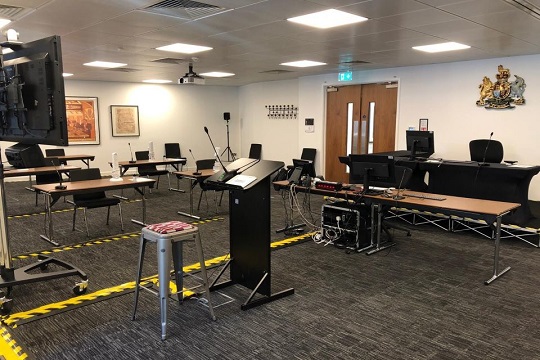
Almost half of the temporary Nightingale Courts set up at the start of the pandemic are to close, the Ministry of Justice has announced.
Temporary courts were opened in hotels and conference suites to help manage the massive backlog in cases, which has worsened since Covid hit.
Eleven of the centres will close within weeks, but another 12 in England and Wales will stay open for one more year.
These will mainly focus on reducing waiting times for criminal trials.
There are around 59,000 criminal trials waiting to go before a judge – and recent figures show the average time between reporting an offence and a verdict being given is now longer than ever.
Nightingale Courts opened in 2020 because many centres were too small to ensure safe social distancing between lawyers, witnesses, defendants and staff.
Ministers hope the 12 courts being kept open until March next year will help cut backlogs, mainly in south-east England, London and the Midlands.
Justice minister James Cartlidge said Nightingale Courts were still “a valuable weapon in the fight against the pandemic’s unprecedented impact on our courts, providing temporary extra capacity”.
He said other measures, such as remote hearings and increased magistrate sentencing powers, meant “we are beginning to see the backlog drop so victims can get the speedier justice they deserve”.
The 11 Nightingale Courts due to be shut at the end of the month are in Middlesbrough, Peterborough, Nottingham, Warwick, Manchester, Liverpool, Bolton, Chester and Winchester.
Others in Maidstone, Chichester, Telford, Wolverhampton, Birmingham, Leeds, Swansea, Cirencester and Fleetwood will all stay open until March 2023.
In London, courts set up in Prospero House, Barbican and Croydon will also stay open, while those in Petty France and Monument will close in the coming weeks.
Meanwhile, criminal barristers are balloting over a form of industrial action as part of a continuing row with the government over funding.
They warn that so many lawyers are quitting criminal justice, there will not be enough left to help further reduce the backlogs.
Source: bbc.co.uk






Be the first to comment